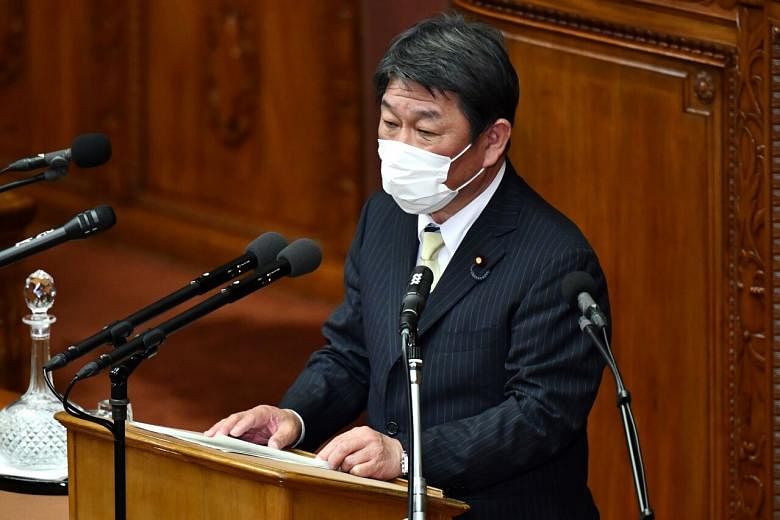TOKYO - Japan can play a key role in staving off a potential collision course between the two superpowers United States and China, experts told a geopolitical forum on Friday (Feb 26).
Japan can set the agenda, as a close security ally of the US and a close neighbour of China's, they said at the second Tokyo Global Dialogue held by the Japan Institute of International Affairs think-tank.
The experts noted that the idea of strategic competition and cooperation at the same time is "inherently contradictory".
"To maintain the right balance will become increasingly difficult, since it is likely as competition will intensify on the one hand and cooperation will deepen at the same time," said Dr Akio Takahara of the University of Tokyo.
He added that this would complicate policy-making since - for many countries including Japan - any strategic distrust cannot be decoupled from the strong economic ties. China has extended aid to much of the developing world, while also using trade as a lever against countries like Norway, South Korea and Australia.
Japanese Foreign Minister Toshimitsu Motegi noted at the same forum on Thursday that history is dotted with plagues that have overturned the power balance, citing this as evidence that the same could well happen as the world gropes towards a post-Covid-19 order.
"We need to be aware of the fact that Covid-19 as a game-changer has provided those who attempt to create an international environment that is uniquely convenient for them with the motivation to take more ambitious actions," he said.
This concern has shaped Japan's foreign policy into one that involves the building of "multi-layered network of rules-based partnerships", even as it says it is ready to work with China on issues like the economy and climate change.
Fudan University dean Wu Xinbo noted on Friday that Japan has played a role in raising the temperature on regional maritime issues, though it has also helped ease economic tensions amid the US-China trade war triggered by former US President Donald Trump. .
"More broadly, Japan can play a constructive role to promote China-US cooperation on global governance issues," he said. "It really is up to Japan to decide, according to its national interests."
Earlier this month, Japan protested against a recent Chinese Coast Guard law to allow its patrol ships to fire at foreign vessels in disputed waters that Beijing deems its own, warning that the law would only serve to inflame tensions.
Japan's ruling party lawmakers on Thursday said that the pacifist Constitution does not preclude the Japan Coast Guard from shooting at foreign vessels if its sovereignty is deemed to be under threat. China and Japan are mired in a territorial dispute over the East China Sea islets known as Senkaku to Tokyo and Diaoyu to Beijing.
Dr Takahara said: "We in Japan think we helped China very sincerely in its efforts to develop and modernise, but now there's no choice for us but to respond to China's maritime advancement and its attempts to change the status quo by physical force."
He added: "So while increasing our defence and coast guard budget, we are pressed to think that we need to reinforce our alliances and our networks, even as at the same time we all understand that economic interdependence with China is deepening every day, even now."
In light of the heightened tensions in the Indo-Pacific, retired four-star US Marine Corps General John Allen, who heads the Brookings Institution think-tank, said that the challenge for US President Joe Biden was to look for a way to "reach an equilibrium that allows for competition without catastrophe".
He added that Beijing has misunderstood the US in thinking that Washington was "monolithically committed to containing China.
"There shouldn't be an inherent fear of the US having a detente or a conversation among democracies about the future in the context of creating greater competitiveness," he said. "This does not necessarily create an outcome of containment (and) all of us need to find a way to manage the competition so as to reduce confrontation."
Prof Jia Qingguo of Peking University agreed that positive competition was not necessarily a bad thing, since it can spur both countries to do better for the benefit of the world in areas like climate change.
But he added that there are question marks over how the US under Mr Biden will manage the thorny issues between both sides as well as how Beijing will react, given the severe public sentiment in China towards the US.
"A truly benign strategic competition still remains a difficult, if not impossible, mission to achieve," he said.


